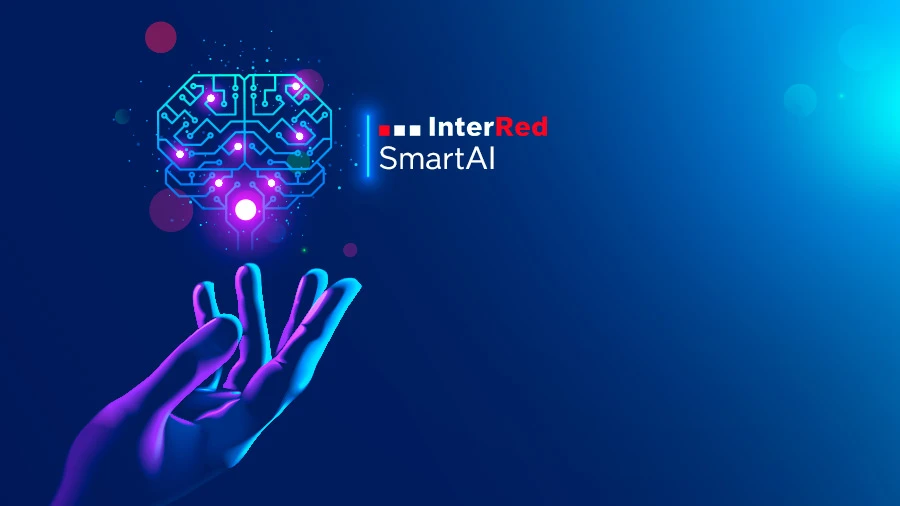
Artificial Intelligence
The InterRed ContentAgents make AI usable in all areas of everyday editorial work. Artificial intelligence for automation, recommendations and multi-channel publishing with InterRed.
InterRed ContentAgents: SmartAI & Computer Aided Writing

GPT is changing the way we deal with texts
When creating a text, editing options such as ‘copy & paste’, formatting and spell checking are now taken for granted. AI systems such as ChatGPT, GPT-3, GPT-4, GPT-Turbo from OpenAI or Claude from Anthropic promise significantly more extensive support in text creation. Great progress has also been made in the transcription of videos and audio recordings such as podcasts, as well as in the tagging or generation of images (DALL-E, Midjourney, Stable Diffusion, etc.).
What the new generative AI processes based on so-called LLMs (Large Language Models) have in common is an inherent unpredictability of results. This is particularly problematic because it is also impossible to predict whether the result is correct.
GPT stands for ‘Generative Pretrained Transformer’. A GPT such as ChatGPT is based on a relatively simple principle: it can generate the most probable ‘next word’ for a given text based on countless learned texts and sentence patterns. It then uses the given text and the first word generated to generate the next word. And so on.
In this way, a GPT is able to generate a text for a given question that is highly likely to be a suitable answer. Or, when the sentence ‘Shorten this text’ is added to a text, it can generate a shortened version of that text.
Why are GPT results so unreliable?
A GPT - like everything in the world of computers - is actually deterministic. Therefore, the answer to a given question would always be the same; even verbatim. So why is ChatGPT not deterministic? As described, a GPT always generates the "next word" with the highest probability. Since there are many words that are very close to this highest probability, this is used to introduce "creativity" into the behavior of GPT. To do this, one of the words with the highest probability is chosen at random. Initially, this makes little difference, but since this little touch of randomness is also added with each additional word generated, a sentence with only 10 words and the assumption that there are ten options to choose from for each word already results in "1010", i.e. a billion, variants. In this way, a GPT can generate countless texts on one topic.
Why don't GPTs always cite sources?
If you let a GPT work on the basis of a given text and few ‘instructions,’ the results are usually good. The smaller the basis in terms of the number of documents learned for the text to be generated, the less reliable the result. What is particularly problematic here is that a GPT can only cite a source for a generated text if it was generated based on one or more specific documents. Why is that?
A GPT has learned all its information and its ability to generate text based on an incredibly large amount of text. Generated text is therefore never based on a single source. Only if you instruct a GPT to use one or more texts as the basis for a text to be generated, a search or similar, can a direct reference be made.
Otherwise, the results are based on all the texts on which the GPT was trained.
This can be compared to humans. We would not be able to cite the sources for all our statements either. This is not only because our memory is limited, but also because we base our statements on many sources that we have become aware of throughout our lives. In the process, identical information reinforces itself and contradictions weaken each other.

SmartAI - reliable artificial intelligence (AI) that respects boundaries and rules
InterRed ContentAgents are based on state-of-the-art AI technology. A unique selling point is the reliability of the processes used. The AI of ContentAgents always observes the set limits and rules. GPT technology is only used in the form of self-correcting GPT. And generated texts always contain references to the underlying sources.
A self-correcting GPT independently monitors compliance with specified rules – both in terms of content and form. For example, if it is asked to name three key characteristics of self-correcting language models, each in a single keyword, it adheres precisely to this specification: It names exactly three terms, each limited to one word, without additional explanations or digressions. In addition, it indicates the underlying source for each individual keyword – such as a scientific paper, a technical document or a documented recommendation for use – in order to make the origin and traceability of the terms transparent.
We call our AI, which adheres to rules and boundaries and documents the underlying sources of generated content, ‘SmartAI’.
Efficiency and reliability
With ContentAgents, AI can be used for any form of computer-aided writing without uncertainty. Thanks to SmartAI, there is no need for the sometimes time-consuming checking of AI results, which otherwise often eats up the time saved.
Reliable AI: Trust through InterRed SmartAI
InterRed SmartAI stands for artificial intelligence you can trust. As part of our content technology, SmartAI works according to clear rules: secure, traceable and under control at all times. Decisions remain reliable and explainable to humans: Reliable AI.
Max Tegmark, physicist at the Massachusetts Institute of Technology (MIT) and co-founder of the Future of Life Institute, is one of the leading voices for AI development. His assessment of AI is very clear:
‘A powerful tool that we can control – that's the key. I like to drive a fast car on the motorway, but only when I have my hands on the wheel.’1
He and his team have investigated whether AI can be tested by AI. In the form of a chain of AIs, in which a ‘slightly smarter’ AI controls the next one: ‘Our simulations showed that this does not work.’ This is documented in detail in the scientific study ‘Scaling Laws for Scalable Oversight’ (Engels, Baek, Kantamneni & Tegmark, 2025, arXiv:2504.18530). In it, researchers at MIT show that AI systems cannot reliably control each other. This proves that AI alone cannot deliver reliable results.
That is why InterRed SmartAI relies on a reliable control authority: a transparent, traceable supervisory level that ensures that AI always operates within the framework of human specifications. This allows it to remain a powerful but always controlled tool for greater efficiency while maintaining security and trust.
InterRed ContentAgents provide support when working with content
The ContentAgents automatically analyze all content from the InterRed ContentHub as a basis for your work. Any other sources can be added. The analysis is carried out completely autonomously based on the predefined sources.
The InterRed ContentAgents recognize the topics based on the connections in the individual texts. They learn independently, for example, to distinguish topics about a (parking) bank from topics about financial institutions (banks) and to link them with other suitable content. For example, they would assign articles about the money economy to the topic "bank" (as the financial institution), but never to the topic "bank" (as a park bank).
This is achieved through so-called ‘embeddings’. These allow words and documents to be transformed into mathematical objects (vectors). This can then be used, for example, to measure semantic distance or to determine the word that is semantically closest to another.
The InterRed ContentAgents also recognize people and places and provide further information about them. They can also contextually classify and associate synonyms, i.e. associate words such as "sun" or "warmth" with "summer".
Because they learn independently, constantly readjust themselves and automatically pick up and incorporate new topics, they are clearly superior to manual, hierarchical classification systems such as tagging, ontologies, categorizations or keyword directories. In day-to-day practice, it quickly becomes clear that AI delivers significantly better results than manually maintained and updated classification systems, which can involve a great deal of effort.
Specific benefit: Automation – usable in all areas of everyday editorial work.
Automated print production - SmartPaper
All processes for creating a print product can be automated with SmartPaper technology. From the selection of suitable content, the choice of suitable images and image sections to the automated layout and shortening of text. A complete edition can be created automatically in just a few minutes. And thanks to the SmartAI, which adheres strictly to specifications, the face of the product is retained and the result does not have to be laboriously checked. Among other things, InterRed SmartPaper uses the artificial intelligence of InterRed ContentAgents and thus the InterRed SmartAI technologies for automation.
Recommendation of related content - on websites and in daily work
Whether in everyday editorial work or at the touchpoint for the target group. The ContentAgents offer a powerful recommender system that can recommend related texts and images. Suggestions for texts to be linked or suitable images can be integrated into a text simply by dragging and dropping. And at the touch of a button, the AI can generate SEO-optimized links based on up-to-date SEO data at any time. The optimal teasers can be displayed on mobile and web. You set the target. Whether reach, reading time, paywall conversion or product purchase, the ContentAgents support the implementation of the respective strategy.
SmartCollections instead of manual work - using content automatically
Instead of laboriously selecting texts and constantly adapting them to new circumstances over time, SmartCollections make it very easy to define a group of texts with the help of AI. These can then be used as required. For example, for teasers, a newsletter or part of a print product. As soon as new texts are created that fall within the definition of the SmartCollection, the usage - no matter where - is automatically updated. This feature also makes SmartCollections suitable as a "content radar". You can have the AI automatically inform you about new texts. By e-mail or message in Microsoft Teams, for example.
InterRed FlowEditor - writing in the flow
The integration of ContentAgents into the InterRed FlowEditor makes AI easy to use. Headings, subheadings, bulleted lists, pre-texts, teaser texts, summaries and social posts (Twitter tweets etc.) can be created at the touch of a button while writing in the editor. And, thanks to SmartAI, always reliably according to your own specifications.
Max Tegmark, DIE WELT | 7 November 2025, p. 26
InterRed ContentAgents: future-proof artificial intelligence
The InterRed ContentAgents offer future-proof AI - both for InterRed users and end users.
Various specialized agents have been created to provide optimized support for a wide range of tasks. A description of the individual ContentAgents can be found by clicking on the individual titles.
ContextAgent

The ContextAgent is the semantic recommendation system of the ContentAgents. Using state-of-the-art methods (text data mining, concept detection), the ContextAgent analyzes content and independently finds "related texts". The manual input of additional information (metadata) is not necessary; the ContextAgent works autonomously.
Similar to a human brain, the neural network of the ContentAgents applies newly acquired knowledge (new texts) to existing information.
The intelligent, content-related linking of texts enables innovative, intuitive information retrieval as well as an optimal presentation of existing texts and information. By structuring large amounts of data (big data), the relevant content is recommended in each situation.
The automatically generated recommendations increase the information content as well as the interest of the users and thus increase the click rate and depth on your own website. When used in an intranet, the clever combination of old knowledge and new questions can create something truly new.
TranslationAgent

With TranslationAgent, texts or text passages can be automatically translated into any desired language – directly within the InterRed interface. After selecting the desired target language, the AI generates the corresponding text, which can then be accepted or rejected. This makes multilingual work significantly more efficient and seamlessly integrated into existing editorial processes.
FreePromptAgent

With FreePromptAgent, you can create and reuse custom AI commands directly in InterRed. Users with the appropriate rights can create their own prompts, which are then available system-wide. The agent dialogue offers a wide range of options, such as selecting the tone, language, role and target position for the content.
BulletpointAgent

Optimize your information processing with the BulletpointAgent. This automatically generates precise bullet points from texts - for quick capture of key information. Save time, gain clarity and share relevant content effortlessly. Whether reports, articles or specialist literature - the BulletpointAgent brings efficiency and conciseness to your communication.
ConclusionAgent

The InterRed ConclusionAgent is the key to convincing conclusions. This innovative AI tool automatically gives texts powerful endnotes - perfect for the final impression. Regardless of the type of text, the ConclusionAgent emphasizes key points and leaves a lasting impression. Increase the persuasiveness of your content effortlessly - an absolute must for effective communication.
RewriteAgent

The RewriteAgent is the solution for versatile rewriting of texts. The powerful tool transforms texts into different tonalities and optimizes a text for different use cases. These include, for example, search engine optimized, factual, scientific, didactic, advertising, humorous, satirical or empathetic. With automatic source referencing, the newly created text always retains its integrity. Expand your communication options and adapt content to different contexts - an indispensable resource for flexible and targeted text design.
KeywordAgent

The KeywordAgent analyzes content and independently delivers the corresponding keywords. Based on ContentAgents technologies, it scours the available content universe and concentrates the selection on significant keywords. This makes manual keywording a thing of the past.
TranscriptAgent

The TranscriptAgent enables the automatic transcription of video and audio files. Fast, precise and efficient - ideal for media, companies and content creation.
TOPAgent (TextOnPictureAgent)

TOPAgent analyses images using state-of-the-art face, object and text recognition and automatically determines the ideal position for text. The appropriate text colour is dynamically adjusted and, if necessary, a blurring effect ensures better visibility. Perfect for automated image-text combinations in marketing, social media and publishing.
NERAgent

The NERAgent (Named Entity Recognition) recognizes people, companies and places, among other things. This enables the automated creation of glossaries and dossiers, for example. At the same time, it enables users to find central knowledge carriers.
SynonymAgent

The SynonymAgent provides related words for a word or phrase and enables simple and targeted search functions. Like a kind of thesaurus, it supports the user in the search for synonyms.
The SynonymAgent is ideally suited for "Semantic Query Expansion", i.e. meaning-related expansions of search queries that provide the user with better, more precise results than conventional methods.
AssociationAgent

For example, "building" is a synonym for "house". The AssociationAgent analyzes the relationship between terms and therefore displays terms with similar content. In this example, suitable associations for the term "house" would be "property", "building insurance", "parking lot" or "garden".
The AssociationAgent therefore enriches the search spectrum by offering its own "word clouds" and making them usable.
GeoAgent

The GeoAgent automatically recognizes all towns and cities within Germany in texts, can also specify the appropriate town or city for a zip code and has a radius search function.
The GeoAgent thus enables the automatic localization of information. The benefits are extremely diverse: local key topics can be determined without manual effort and automatically made visible on web portals. In the increasingly locally oriented world of mobile devices, users can now be automatically offered information that is geolocally relevant to their own environment in addition to thematically appropriate information. These functions are also a decisive advantage in editorial production processes, for example in local editorial offices (local newspapers) when researching, creating and linking topics. Like all ContentAgents, the GeoAgent automatically determines locations and their geo-coordinates and links them on a virtual map so that topic-specific proximity searches can be carried out with minimal effort.
Ready for the future of artificial intelligence?

Are you interested?
Contact us. We look forward to your message.